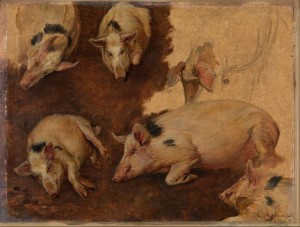
L. Syd Johnson (HU) published a paper, “Pigs as Spare (Human) Parts” in Impact Ethics.
(This article originally appeared in Tech Today.)

L. Syd Johnson (HU) published a paper, “Pigs as Spare (Human) Parts” in Impact Ethics.
(This article originally appeared in Tech Today.)
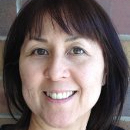 L. Syd Johnson (HU) presented a paper, “The Vulnerability of Non-human Animals Used in Research” as part of the “Minding Animals: Ethical Implications for Research” panel session at The American Society For Bioethics and Humanities Annual Meeting, in Houston Texas last Thursday, and last Saturday she led the Neuroethics Affinity Group Meeting at ASBH.
L. Syd Johnson (HU) presented a paper, “The Vulnerability of Non-human Animals Used in Research” as part of the “Minding Animals: Ethical Implications for Research” panel session at The American Society For Bioethics and Humanities Annual Meeting, in Houston Texas last Thursday, and last Saturday she led the Neuroethics Affinity Group Meeting at ASBH.
(This article originally appeared in Tech Today.)
The Humanities Department will be hosting an afternoon, hands-on, workshop for Michigan Tech students on gaming and social advocacy. Students will play games, design aspects of a digital game, and discuss how gaming might be used to promote active participation in social issues and citizenship.
This event is Free and open to the public! Space is limited!
Register by October 31st at http://bit.ly/1NbMoK2
When: Friday, November 6 12:30-3:30pm
Where: Walker Arts and Humanities Center, 120C
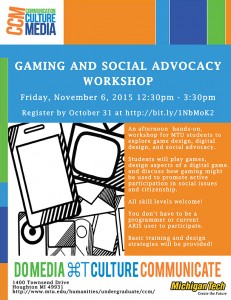
Last Friday, three Michigan Tech faculty attended TeachingWorks, sponsored by the University of Michigan. Shari Stockero (CLS), Amy Lark (CLS) and Evelyn Johnson (HU) represented Michigan Tech’s Teacher Preparation program. These convenings will continue for three years and are aimed at developing 19 high leverage teaching techniques practiced across the curriculum. TeachingWorks aims to raise the quality of beginning teaching through partnering with teacher preparation programs.
(This article originally appeared in TechToday.)
 L. Syd Johnson (HU) was in Chicago for the International Neuroethics Society Annual Meeting, last week. She presented a poster, “What can neuroscience contribute to the problem of neonatal pain?” co-authored with Adam Shriver (Penn).
L. Syd Johnson (HU) was in Chicago for the International Neuroethics Society Annual Meeting, last week. She presented a poster, “What can neuroscience contribute to the problem of neonatal pain?” co-authored with Adam Shriver (Penn).
(This article originally appeared in Tech Today.)

Mountaineer and photographer Jimmy Chin will present the opening night film at this year’s 41 North Film Festival with his award-winning film Meru. The festival runs from October 23 to the 25th in the Rozsa Center for the Performing Arts and will showcase 17 independent films from all over the world, two featured filmmakers, and an Oculus Rift exhibition. “I travel to film festivals during the year and try hard to keep up with what’s happening in independent cinema,” said festival director Erin Smith. “I pay particular attention to what the community here would be interested in, as well as to programming films that are receiving critical acclaim.”
The opening night film Meru tells a captivating story about risk, determination and friendship, following the efforts of three internationally famous climbers (Chin among them) to reach the Shark’s Fin summit of Mount Meru in the Himalayas. Smith said, “This is the biggest event we’ve ever organized for the festival.” Chin is an award-winning photographer whose work has been featured regularly in National Geographic, and his film won the 2015 Sundance Audience Award. Meru will be shown at 7:30 p.m., Friday, Oct. 23. Chin will speak after the film, answering questions and meeting with students.
Another festival highlight is a new documentary about the Taser Corporation, Killing Them Safely. With significant implications for engineering ethics and marketing, this documentary investigates how a weapon marketed as “safe” has become responsible for scores of deaths each year. The film will be shown at 7:30 p.m. on Saturday, Oct. 24 with director and journalist Nick Berardini present.
Smith, who is also director of the Humanities Digital Media Zone and teaches digital media and film, said the festival was started eleven years ago to help film students consider the context of film viewing and how and why films get made outside of the dominant Hollywood system. “A festival setting is a much different experience than watching a movie at home or even in a multiplex theater,” she said. As the festival has evolved, it has come to involve more of the Michigan Tech and surrounding community each year.
“I think it’s a unique opportunity for students to view films that we really don’t get access to up here,” said Daniel Grayvold, a fourth-year sound design student. “There’s something for everybody.”
On Sunday, Oct. 25, Drone will be shown at 3:30 p.m. with a panel discussion following about drone use in the military. Help Side will be shown at 6:30 p.m. A documentary premiere for recent Michigan Tech graduate and former basketball player Jillian Ritchie, it is a compelling coming-of-age story that takes on the serious subject of sexual assault.
Among some of the other films screening during the weekend are The Wanted 18, King Georges, Here Come the Videofreex, and T-Rex. Closing the festival is the uplifting and inspiring documentary Mavis! about legendary gospel and blues singer Mavis Staples.
The festival will also offer festival goers a chance to try out Oculus Rift virtual reality technology. Projects featured include Herders, which provides an immersive cinematic look into the lives of Mongolian yak herders, and Ferguson Firsthand, which recreates the location of last year’s Ferguson, Missouri shooting and allows users to encounter different perspectives on the event.
Festival sponsors include the Michigan Tech Departments of Humanities and Visual and Performing Arts, the Van Evera Distinguished Lecture Series at the Rozsa Center, Student Affairs and Advancement, the College of Sciences and Arts, Pavlis Honors College, University Marketing and Communication, Career Services, Institutional Equity and Inclusion, the Departments of Social Sciences and Computer Science, the Indigenous Issues Discussion Group, Downwind Sports, and the Continental Fire Company. “The amount of support is really great and a sign that the festival is valuable to our culture here,” said Smith. “I’m grateful for all of it.”
All events are free and open to the public. The festival website with the full schedule and program is online at http://41northfilmfest.org. For more information about the festival and its events, contact Erin Smith at ersmith@mtu.edu.
(This article by Monica Lester originally appeared in Tech Today.)
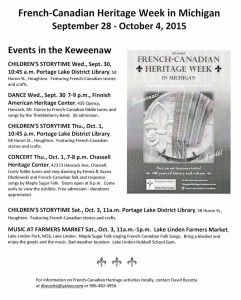 In celebration of French-Canadian Heritage Week in Michigan, the following events are planned:
In celebration of French-Canadian Heritage Week in Michigan, the following events are planned:
(For further information, please click the image.)
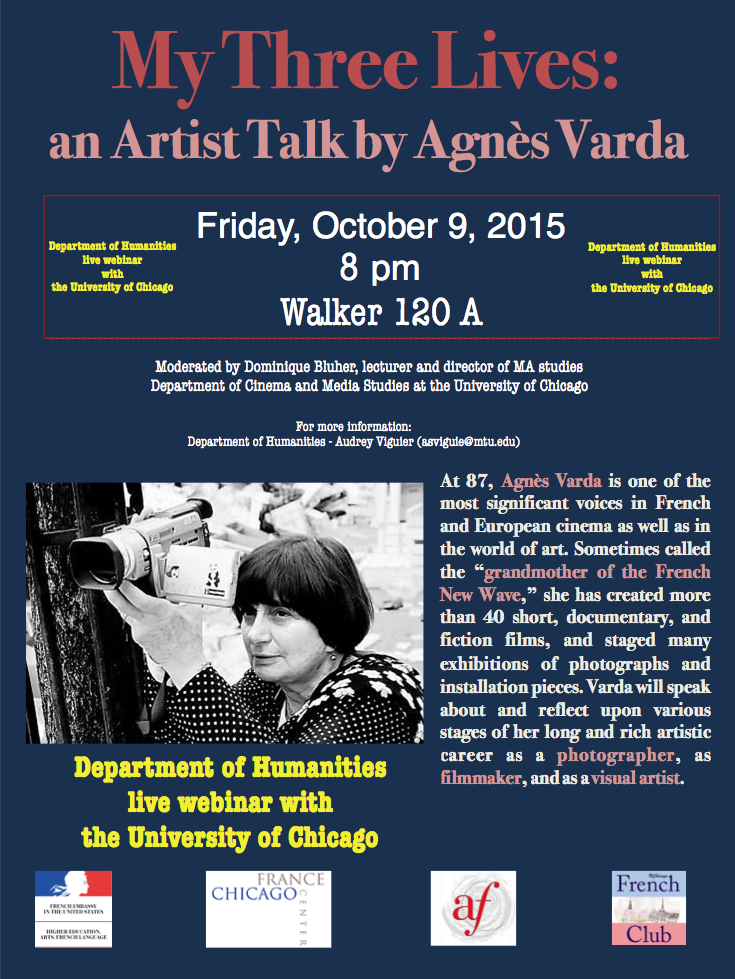 The French director Agnès Varda will be in residence at the University of Chicago in October. We have an exciting event scheduled to celebrate her work and life.
The French director Agnès Varda will be in residence at the University of Chicago in October. We have an exciting event scheduled to celebrate her work and life.
On Wednesday, Sept. 30, Café Francais will host a look at Varda’s work in Walker 134 at 5 p.m. And, thanks to the French Embassy, Michigan Tech is one of nine universities selected to participate in a webinar with the renowned director. It will take place on Friday, October 9 at 8 pm in Walker 120A.
Michigan Tech’s Humanities Department will host an international conference, the bi-annual meeting of the American Society of Exile Studies, Friday and Saturday.
Guy Stern, former German professor and Provost of Wayne State University, will be the guest of honor. His keynote address will be at 1 p.m. on Saturday at the Great Lakes Research Center, and will focus on the “Future of Exile Studies.”
(This article originally appeared in Tech Today.)
The Michigan Tech Graduate School has announced the following Humanities graduate student award recipients:
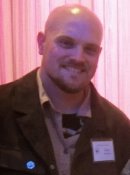 CGS/ProQuest Distinguished Dissertation Award Nominee
CGS/ProQuest Distinguished Dissertation Award Nominee
Gary Kaunonen, PhD Graduate in Rhetoric, Theory and Culture
Rebecca Frost, PhD Candidate in Rhetoric, Theory and Culture
You can find more information on the Graduate School’s Awards and Fellowships page.